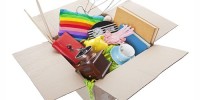

When I was younger, there was a point where I was moving every six months, whether it was just to a new  neighborhood, or across the country to a new state. Although this was sometimes stressful, it did bring something positive to the table – it kept me from accumulating a lot of things. Every time I moved I only brought the essential things I needed, the things that were most dear to my heart. Now, having been in the same place for a while, with no plans to move anytime soon, I’ve noticed that over time, my once pared down collection of items has grown substantially.
neighborhood, or across the country to a new state. Although this was sometimes stressful, it did bring something positive to the table – it kept me from accumulating a lot of things. Every time I moved I only brought the essential things I needed, the things that were most dear to my heart. Now, having been in the same place for a while, with no plans to move anytime soon, I’ve noticed that over time, my once pared down collection of items has grown substantially.
As we get older, it is easy to accumulate belongings and habits that no longer serve us. It is also harder to keep track of excessive belongings, to remember what you have, and where everything is located. Simplifying your life by clearing out some of that proverbial clutter can help you be happier, think clearer and make room in your life for things that are truly important. As you enter the second half of life, don’t be weighed down by the things of your past. Allow yourself to grow from them, and let them go.
The easiest way to start simplifying your life is by following these two simple steps: identifying the important things in your life, and then eliminating everything else. However many people need more guidance than just that. Here’s a more detailed list of things you can do to simplify your life:
What Does Simple Look Like to You
Begin by writing out what a simple life looks like to you. What makes you happy? What brings joy into your life? What causes stress in your life? What feels heavy and cluttered, emotionally and physically? What ranks most important in your life? What can you do without? Go deep within and find out what it is you really want.
Let Go of Things You Don’t Need or Use
As we get older, we tend to accumulate more and more stuff. We hold onto things we no longer need or use because we associate them with a certain memory or person, and we fear that getting rid of things will also mean forsaking the memory associated with the beloved item. One of my favorite things to do in a case like this is to take a picture of the item that I’m having a hard time letting go, pasting it in a scrapbook, then writing down who, what, and when the item reminds me of, and what I think I’ll be missing if I let go of the item. This way you’ll always have the written and visual memory whenever you want to revisit it, an inventory of precious items if you choose to keep them, and a history to share with younger members of your family.
Declutter
Start with the big things in your house- unused furniture, appliances, and vehicles.
Many people spend thousands of dollars keeping things in storage without actually using them again. Enlist a friend or relative to help you (ideally one who is well versed in that art of letting go) to help you make decisions. Go through drawers and closets, and really think about what you need, and what is just taking up space.
Automate As Much As Possible
The digital age has allowed for much of our bill-paying to be automated. When you receive a bill, look to see if it has a “Pay Online” option. If you’re not computer savvy, ask someone who is to help you set up monthly payment options. This will save you time and also minimize the amount of paper bills you receive and need to store.
Buy Less and Buy Consciously
Only buy what you really need. Always ask yourself “Do I really need this”? If it feels anything like an impulse-buy, wait. Let some time go before you buy. It’s easy to fill our life with stuff because we equate it with happiness. True happiness isn’t something you can buy, it’s something you create within yourself.
Make Time For The Things That Matter
We tend to stuff our day with things we “NEED” to do. Look at your daily to-do list. What is essential, and what is busy work? What can be delegated? It’s important to make time for yourself and time for the ones you love.
Is connection and friendship important to you, but you find yourself with little to no time to nourish them or make them? Put it at the top of your to-do list. Your happiness is what should come first.
Learn to Say No
This is one of the most important things you can do for yourself. If you don’t learn to say no, you’ll never have enough time for the things you truly want to do.
Author: Kimberly Recor, staff writer at Designing Brighter Tomorrows
© 2014 Designing Brighter Tomorrows, Inc.
This site is for information only, and is for your voluntary use at your own risk. See Terms of Use